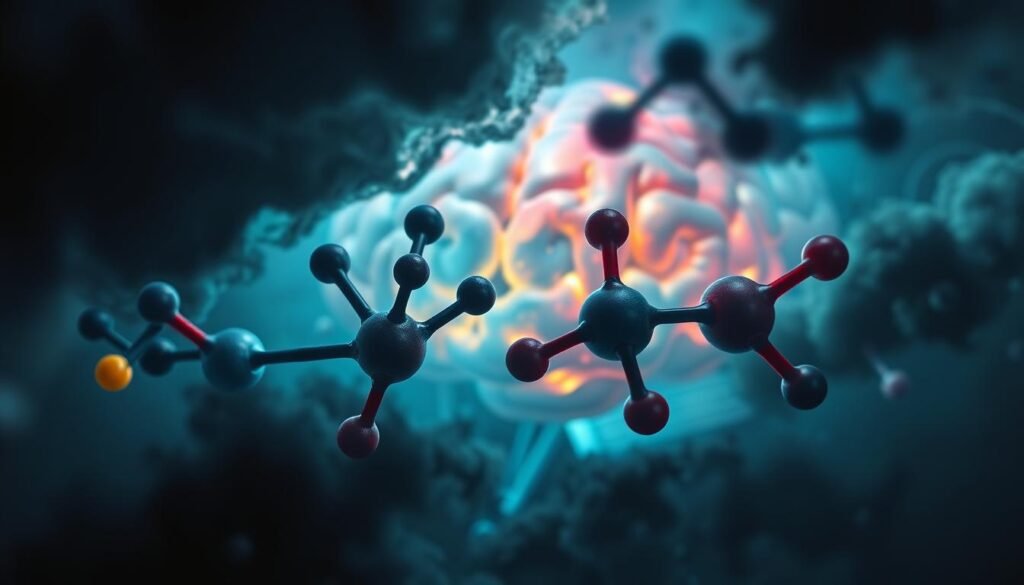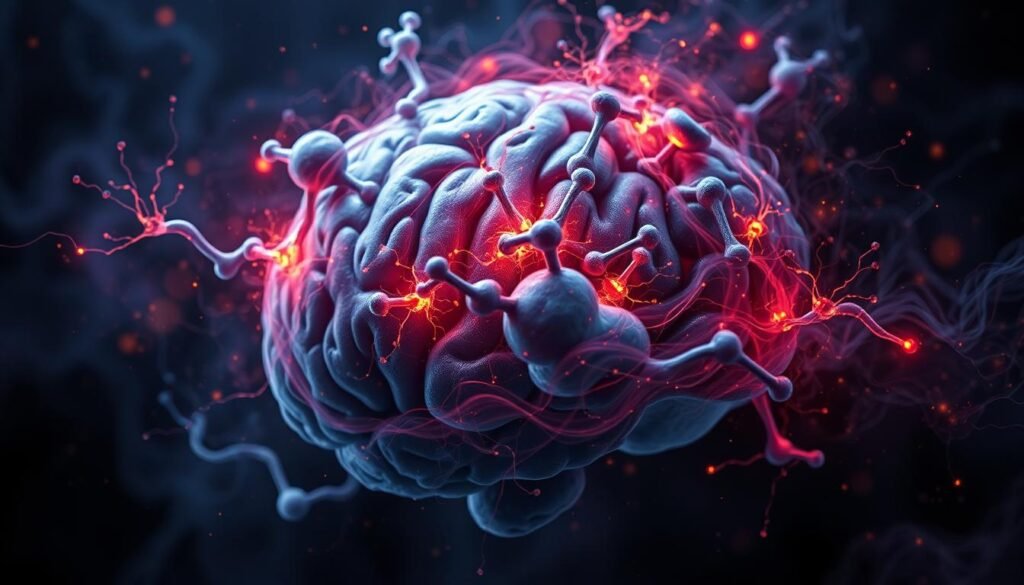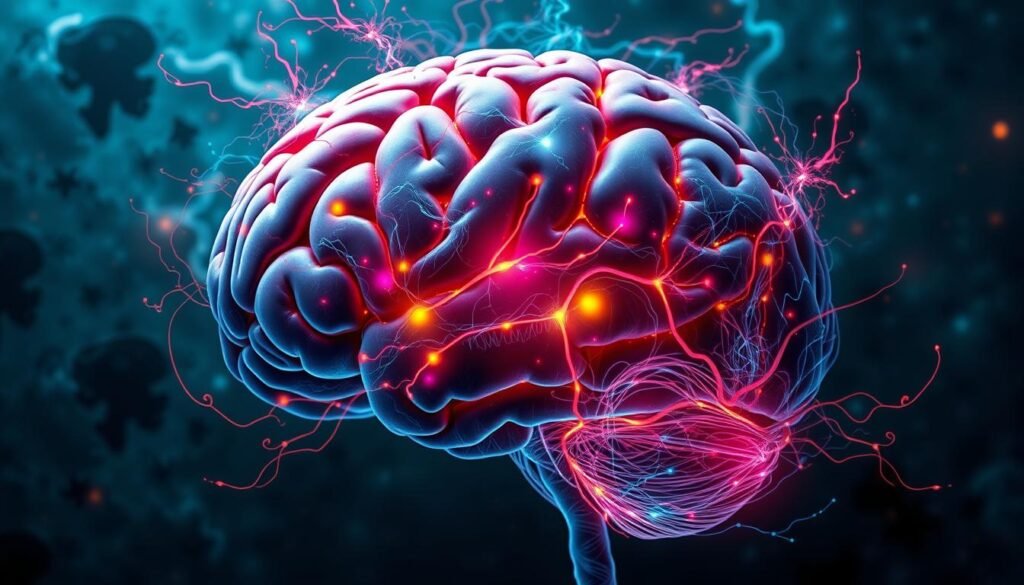Scientists have found more than 100 neurotransmitters. Glutamate is the most common one, key for thinking, learning, and memory. It’s essential to know about brain chemistry and anxiety. Neurotransmitters impact how we control emotions and anxiety disorders.
Anxiety disorders mess up how our brain handles emotions. The amygdala spots threats and reacts. The prefrontal cortex tries to manage these reactions. Important neurotransmitters like serotonin, GABA, dopamine, norepinephrine, and cortisol affect this process. They make understanding anxiety complex.
Studies show problems with neurotransmitters can cause anxiety disorders. It’s vital to understand these neurotransmitters for treatment. Knowing their roles helps us figure out anxiety causes and treatments.
Key Takeaways
- Over 100 neurotransmitters influence emotional regulation, including serotonin and GABA.
- The amygdala and prefrontal cortex play pivotal roles in anxiety disorder responses.
- Understanding neurotransmitter dysfunction is essential for effective treatment strategies.
- Much of the research focuses on how neurochemical imbalances lead to mental health disorders.
- Exploring neurotransmitter roles provides clarity on brain chemistry and anxiety.
Understanding Anxiety Disorders
Anxiety disorders are conditions like general anxiety disorder and social anxiety disorder. They start from seeing dangers that may not be real. When anxiety is too much or comes too often, it can really mess with someone’s life.
Why do these disorders happen? Sometimes it’s because of chemical imbalances in the brain. Chemicals like serotonin and GABA are out of balance, leading to more anxiety. Also, the limbic system, which deals with our emotions, can affect how we feel.
Doctors use a guide called the DSM-5 to diagnose anxiety disorders. This guide talks about different types, like generalized anxiety disorder and panic disorder. Knowing these types helps doctors find the best treatment. Treatments often include talk therapy and medication.
Many things can lead to anxiety disorders. Stuff like past experiences, genes, and the stress around us play a part. Understanding these causes helps in finding the right treatment. For more info on how anxiety works in the brain, check this link.
The Role of Neurotransmitters in Anxiety
Neurotransmitters are crucial in managing anxiety. They help control our feelings of fear and worry. The brain uses chemicals like serotonin, GABA, dopamine, and others. They help handle stress and emotions. This balance is key for our mental health.
Studies show that problems with neurotransmitters can make anxiety worse. For example, people with general anxiety often have lower serotonin. This chemical is important for a good mood. Similarly, if GABA isn’t working right, a person may feel more anxious. GABA usually helps calm us down.
Norepinephrine is another chemical that reacts to stress. If its levels go up, so does anxiety. It shows how important balance is for feeling stable. On the other hand, dopamine affects how we see rewards. If it’s off, anxiety can hang around, especially around others.
Understanding how neurotransmitters affect anxiety is vital. It shows the link between our body’s biology and our mental state. This knowledge helps in making treatments that address both sides. It’s key in helping people feel better and find balance.
What Neurotransmitter Causes Anxiety: Brain Chemistry
Anxiety is complex and often involves neurotransmitters. Changes in brain chemistry play a big role in anxiety disorders. Neurotransmitter issues can create chemical imbalances. This affects how we manage emotions and act.
Lowered serotonin is closely linked to anxiety. GABA, which helps calm us, is crucial for controlling our emotional reactions. Less GABA activity can make anxiety worse. Moreover, glutamatergic receptors affect how neurotransmitters work, creating a varied emotional state.
Genetics and the world around us influence how we experience anxiety. Knowing how to spot anxiety disorders helps people look for the right treatments. This is important for fixing neurotransmitter imbalances.
Many with anxiety don’t get better with usual drugs. Understanding neurotransmitter interactions is key for new treatments. Fixing brain chemistry could reduce anxiety and boost happiness.
| Neurotransmitter | Role in Anxiety | Associated Dysfunction |
|---|---|---|
| Serotonin | Regulates mood and emotional responses | Low levels linked to anxiety disorders |
| GABA | Calms neural activity | Impairment associated with increased anxiety |
| Dopamine | Influences reward and pleasure | Dysfunction may contribute to anxiety during social interactions |
| Norepinephrine | Involved in fight-or-flight responses | Elevated levels can exacerbate anxiety symptoms |
| Nitric Oxide | Regulates neurotransmitter release | Impact on anxiety behavior when signaling is inhibited |
Serotonin and Anxiety
Serotonin is key in controlling our feelings and thoughts. Having low serotonin can make people more likely to have anxiety. By knowing how serotonin impacts anxiety, we can find better ways to help those with anxiety disorders.
Impact of Low Serotonin Levels
Low serotonin often means more anxiety and mood issues. Studies show that certain brain cells can make anxiety worse when they’re activated. This highlights how important serotonin is for managing our emotions.
When serotonin is low, people might feel grumpy, experience mood changes, and feel more anxious. This can really impact someone’s life in a negative way.
Therapeutic Approaches Using Serotonin
There are treatments that focus on serotonin to help with anxiety. SSRIs are a type of medicine that increases serotonin levels. Though they work well for many, some might feel more anxious when they first start these medications.
Therapies like cognitive behavioral therapy can also help increase serotonin naturally. Other options include eating certain foods, taking herbal supplements, staying active, and practicing mindfulness. These methods provide broad support for those dealing with anxiety.

GABA and Anxiety
GABA, or γ-aminobutyric acid, is key in managing anxiety and regulating emotions in the brain. It acts as the main inhibitory neurotransmitter. This means it helps calm brain activity, which is vital for staying balanced when stressed. If GABA levels drop, people often feel more anxious. This shows why it’s crucial for handling fear and stress.
GABA’s Role in Emotional Regulation
GABA works by modulating the brain circuits that deal with how we feel, especially in the amygdala. That’s our brain’s fear center. When GABA activity goes up, we feel calmer and less anxious. It’s important because it makes nerve cells less excitable. This helps us stay in control when facing scary situations.
Medications Targeting GABA Receptors
There are many medicines aimed at GABA receptors to ease anxiety symptoms. Benzodiazepines were often used in the past. Now, the focus is more on selective serotonin reuptake inhibitors (SSRIs). However, drugs like diazepam and alprazolam work on GABA-A receptors. Even so, researchers are still looking into new GABAergic drugs. They want to find better treatments for anxiety disorders.
Dopamine and Anxiety
Dopamine is known for its role in reward and pleasure. But it also affects our anxiety levels. Studies show a complex link between dopamine and anxiety. This link shows how imbalances in dopamine can lead to anxiety disorders.
Recent Findings on Dopamine’s Influence
Research has found that changes in dopamine levels affect emotions and anxiety. High levels of dopamine can make anxiety worse, especially in social situations. People with too much dopamine often feel stressed and can’t concentrate well. This shows how important balance is for our emotions.
Dopamine Modulation in Social Anxiety
Social anxiety is when people are very afraid in social places. Research suggests changing dopamine levels could help treat social anxiety. Medications that adjust dopamine could lessen anxiety symptoms. This can make socializing easier and improve life quality.
Exercises and foods rich in dopamine also help manage dopamine better. This can reduce anxiety symptoms.

Norepinephrine and Anxiety
Norepinephrine plays a big role in how we react to stress. It works as a hormone and a neurotransmitter. Its levels change when we face stress. Knowing how it links to anxiety could help us find better ways to treat anxiety disorders.
The Effects of Stress on Norepinephrine Levels
Stress makes the brain release more norepinephrine. This makes us more alert and increases our heart rate. It’s part of our fight-or-flight reaction. If stress is always there, norepinephrine levels stay high. This might lead to anxiety symptoms that are hard to handle. Around 40 million Americans deal with anxiety disorders each year.
Norepinephrine’s Role in Adrenaline Response
Norepinephrine and adrenaline work together when we’re stressed. They help our bodies stay energetic and maintain good metabolism. The right amount of norepinephrine keeps us balanced. It prevents anxiety, mood swings, and trouble sleeping. But, too little can cause depression and fatigue. Drugs that increase norepinephrine help with anxiety and depression. Exercise can also help balance it, making us feel better overall.
| Condition | Norepinephrine Level | Symptoms |
|---|---|---|
| Excess Norepinephrine | High | Anxiety, irritability, sleep difficulties |
| Insufficient Norepinephrine | Low | Depression, poor memory, low energy |
Researchers are still studying how norepinephrine affects us. Their work could lead to new ways to treat anxiety disorders. If you want to learn more about norepinephrine and mental health, check out reputable sources.
Cortisol and Anxiety
Cortisol is known as the stress hormone because it’s crucial for our stress response. People with anxiety disorders often have higher cortisol levels. It’s important to know how cortisol works with stress and the HPA axis.
Understanding the Stress Response
Our bodies react to threats with a set of complex reactions. This response involves the HPA axis and leads to more cortisol. If stress lasts for a long time, this constant cortisol release can worsen anxiety symptoms.
Cortisol’s Role in the HPA Axis
The HPA axis helps control stress. When we sense stress, the hypothalamus tells the pituitary gland to release ACTH. This makes the adrenal glands release cortisol. For anxiety sufferers, this system might not work right. The result? More stress and anxiety, creating a tough cycle that makes treatment harder.
| Impact of Cortisol on Anxiety | Effects |
|---|---|
| Elevated cortisol levels | Increase feelings of anxiety |
| Chronic stress | Leads to prolonged elevated cortisol |
| Dysregulation of the HPA axis | Contributes to persistent anxiety symptoms |
| Impact on physical health | Can result in various health issues |
| Mental health consequences | Exacerbates stress-related disorders |
Glutamate and Anxiety
Glutamate is the main excitatory neurotransmitter in the brain. It’s key for learning and memory. But, its role in anxiety is complicated. While vital for brain functions, high glutamate levels can also increase anxiety. This affects nearly 18% of adults with anxiety disorders each year.
There’s a noted connection between glutamate and anxiety. Reducing glutamate activity might make anxious feelings worse. Studies on primates show those with high anxiety have less glutamate in areas like the hippocampus. Raising glutamate levels in anxious marmosets lowered their anxiety, showing how complex this relationship is.
Researchers are looking at targeting glutamate pathways for new treatments. Especially in brain area 25, which is important for anxiety management. This could help people who don’t get better with usual treatments like serotonin reuptake inhibitors.
Better understanding glutamate’s link to anxiety could lead to new treatments. This can improve how we help those with anxiety disorders.
Neurotransmitter Imbalance and Anxiety
Understanding how neurotransmitter imbalance affects anxiety is key. It mainly involves neurotransmitters like serotonin, GABA, and dopamine. Changes in these chemicals can make you feel more uneasy.
How Dysregulation Causes Anxiety Disorder
Anxiety disorders, like general anxiety and panic disorder, may stem from changes in neurotransmitter levels. For example, too much dopamine can make anxiety worse. Too little serotonin could leave you feeling constantly scared. These imbalances can cause symptoms like muscle tightness and heart racing. Research into these imbalances is crucial for finding better treatments.
Research on Neurotransmitter Levels
Studies show a strong link between neurotransmitter imbalance and anxiety. However, it’s hard to measure these levels accurately through blood tests. Current research is focused on better ways to understand these imbalances. This could improve how we treat anxiety and related conditions.

| Neurotransmitter | Effect on Anxiety | Dysregulation Symptoms |
|---|---|---|
| Serotonin | Low levels linked to increased anxiety | Persistent worry, irritability |
| GABA | Inhibitory neurotransmitter; low levels cause heightened anxiety | Muscle tension, restlessness |
| Dopamine | Evolving evidence suggests role in social anxiety | Difficulty in social interactions, panic attacks |
| Norepinephrine | High levels can elevate stress responses | Cold sweats, rapid heartbeat |
| Glutamate | Imbalance may contribute to anxiety symptoms | Difficulty concentrating, mood swings |
Conclusion
To truly understand anxiety, we must study how neurotransmitters affect emotions. There are more than 100 neurotransmitters, each with a special role in the brain. This makes the relationship between neurotransmitters and anxiety both complex and interesting.
For example, serotonin helps control our mood, while GABA plays a key role in helping us stay calm. Knowing how these neurotransmitters interact is key to treating anxiety effectively.
Finding out that neurotransmitter imbalances can cause mental health issues helps us find better treatments. For example, some medicines can target GABA to reduce anxiety. Others help boost serotonin, which can help people with seasonal depression. Plus, eating right and exercising can also keep neurotransmitter levels balanced, helping our mental health.
Overall, managing anxiety well means looking at the big picture, which includes understanding neurotransmitters. This way, doctors can offer treatments that really fit what each person needs. By focusing on these brain chemicals, healthcare providers can come up with better ways to treat anxiety.